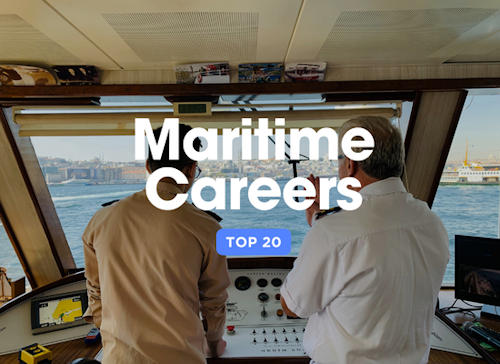The Top Maritime Careers going into 2025 and beyond

The maritime industry offers a diverse range of career opportunities that are both challenging and rewarding. From navigating vast oceans to ensuring the safety and efficiency of maritime operations, professionals in this field play a crucial role in global trade and transportation. Whether you’re interested in the technical aspects of ship maintenance, the strategic management of port operations, or the environmental protection of marine ecosystems, there’s a maritime career that suits your skills and interests. In this article, we explore the top careers in the maritime industry, highlighting their importance, projected salaries, qualifications, and career prospects to help you navigate your future in this dynamic field.

1. Ship Captain
Why It’s Important: Ship captains are responsible for the overall operation and navigation of the vessel. They ensure the safety of the crew, cargo, and ship, making critical decisions during voyages and managing the crew’s activities.
Projected Salary: The average salary for a ship captain ranges from $80,000 to $150,000+ per year, depending on the size of the vessel and the nature of the voyages.
Qualifications:
- Extensive seafaring experience
- Maritime academy degree
- Certification and licensing
- Strong leadership and decision-making skills
Career Prospects: With increasing global trade, the demand for experienced ship captains remains strong. Opportunities for advancement include positions as fleet managers or maritime consultants.
2. Marine Engineer
Why It’s Important: Marine engineers are responsible for the maintenance and operation of the ship’s engines, machinery, and other systems. They ensure that the vessel’s mechanical and electrical equipment runs smoothly, which is crucial for the ship’s safety and efficiency.
Projected Salary: Marine engineers can expect to earn between $70,000 and $120,000+ per year, with senior positions commanding higher salaries.
Qualifications:
- Degree in marine engineering or a related field
- Certification and licensing
- Strong technical and problem-solving skills
- Experience with maritime machinery and systems
Career Prospects: The demand for marine engineers is expected to grow due to advancements in ship technology and the need for efficient and environmentally friendly vessels. Career progression can lead to roles such as chief engineer or technical superintendent.
3. Naval Architect
Why It’s Important: Naval architects design and oversee the construction and repair of ships, boats, and other marine vessels. They ensure that these vessels are safe, efficient, and seaworthy. Their work is critical in creating innovative designs that meet the demands of modern shipping.
Projected Salary: Naval architects typically earn between $65,000 and $120,000+ per year, depending on their level of experience and the complexity of their projects.
Qualifications:
- Degree in naval architecture, marine engineering, or a related field
- Strong analytical and mathematical skills
- Proficiency in computer-aided design (CAD) software
- Creativity and attention to detail
Career Prospects: The demand for naval architects is expected to remain steady, with opportunities in shipbuilding, offshore engineering, and marine consultancy. Advanced roles include senior designer, project manager, and research and development specialist.
4. Deck Officer
Why It’s Important: Deck officers, also known as mates, assist the ship captain in navigation and watchkeeping duties. They ensure the safe operation of the vessel and oversee the loading and unloading of cargo. Deck officers play a vital role in maintaining the ship’s course and handling emergencies.
Projected Salary: Deck officers can expect to earn between $50,000 and $90,000+ per year, with senior positions such as chief mate earning higher salaries.
Qualifications:
- Maritime academy degree or equivalent certification
- Certification and licensing (e.g., Officer of the Watch)
- Strong navigational skills
- Ability to work under pressure
Career Prospects: Career progression for deck officers can lead to becoming a ship captain or moving into shore-based roles such as port operations manager or maritime safety officer.
5. Maritime Lawyer
Why It’s Important: Maritime lawyers specialize in laws and regulations governing maritime activities. They handle legal issues related to shipping, marine insurance, environmental regulations, and maritime contracts. Their expertise ensures compliance with international and national maritime laws, protecting the interests of shipping companies and seafarers.
Projected Salary: Maritime lawyers typically earn between $70,000 and $140,000+ per year, with potential for higher earnings depending on their experience and the complexity of their cases.
Qualifications:
- Law degree with specialization in maritime law
- Strong understanding of international maritime regulations
- Excellent negotiation and analytical skills
- Experience with maritime cases and contracts
Career Prospects: The demand for maritime lawyers is high due to the complexity of maritime regulations and the need for legal expertise in shipping disputes. Career advancement can lead to positions as senior legal advisors, partners in law firms, or roles in maritime regulatory bodies.
6. Marine Surveyor
Why It’s Important: Marine surveyors inspect ships, cargo, and marine structures to ensure they meet safety and regulatory standards. They play a crucial role in preventing accidents and ensuring the seaworthiness of vessels. Marine surveyors also assess damage and provide recommendations for repairs.
Projected Salary: Marine surveyors typically earn between $60,000 and $100,000+ per year, with senior surveyors earning higher salaries based on experience and expertise.
Qualifications:
- Degree in marine engineering, naval architecture, or a related field
- Certification from a recognized maritime organization
- Strong attention to detail and analytical skills
- Experience with maritime inspections and regulations
Career Prospects: Career prospects for marine surveyors are strong due to the ongoing need for safety and compliance in the maritime industry. Opportunities for advancement include senior surveyor positions, consultancy roles, and regulatory positions within maritime authorities.
7. Shipbroker
Why It’s Important: Shipbrokers act as intermediaries between shipowners and charterers. They facilitate the leasing, buying, and selling of ships and cargo space. Shipbrokers play a vital role in ensuring the efficient movement of goods across the globe, negotiating contracts, and securing the best deals for their clients.
Projected Salary: Shipbrokers can expect to earn between $60,000 and $150,000+ per year, with the potential for higher earnings based on commissions and successful deals.
Qualifications:
- Degree in maritime studies, business, or a related field
- Strong negotiation and communication skills
- In-depth knowledge of the shipping market and maritime economics
- Ability to build and maintain client relationships
Career Prospects: The demand for shipbrokers remains robust, driven by global trade and shipping activities. Career advancement can lead to senior broker positions, management roles in brokerage firms, or establishing independent brokerage businesses.
8. Port Operations Manager
Why It’s Important: Port operations managers oversee the daily activities of ports and terminals, ensuring the smooth and efficient handling of cargo and vessels. They coordinate logistics, manage port staff, and ensure compliance with safety and environmental regulations. Their role is essential for maintaining the flow of global trade.
Projected Salary: Port operations managers typically earn between $70,000 and $130,000+ per year, depending on the size and location of the port.
Qualifications:
- Degree in logistics, maritime studies, or a related field
- Strong leadership and organizational skills
- Experience in port operations and logistics management
- Knowledge of safety and environmental regulations
Career Prospects: Career prospects for port operations managers are strong, with opportunities in major ports and terminals worldwide. Advancement can lead to senior management positions, such as port director or logistics director, and roles in maritime consultancy and planning.
9. Maritime Pilot
Why It’s Important: Maritime pilots are highly skilled navigators who guide ships through dangerous or congested waters, such as harbors, river mouths, and canals. Their expertise ensures the safe and efficient movement of vessels, preventing accidents and protecting the marine environment.
Projected Salary: Maritime pilots can expect to earn between $100,000 and $200,000+ per year, depending on their location and the complexity of the waterways they navigate.
Qualifications:
- Extensive seafaring experience
- Certification and licensing as a maritime pilot
- In-depth knowledge of local waterways
- Strong decision-making and navigational skills
Career Prospects: The demand for maritime pilots remains high due to the need for safe navigation in complex maritime areas. Career advancement can lead to senior pilot positions or administrative roles within port authorities.
10. Marine Environmental Scientist
Why It’s Important: Marine environmental scientists study the impact of human activities on marine ecosystems. They develop strategies to protect and preserve ocean environments, conduct research on pollution, and advise on sustainable practices. Their work is crucial for maintaining biodiversity and ensuring the health of marine life.
Projected Salary: Marine environmental scientists typically earn between $60,000 and $100,000+ per year, with higher salaries for those in senior research or advisory positions.
Qualifications:
- Degree in marine biology, environmental science, or a related field
- Strong research and analytical skills
- Experience with marine conservation projects
- Knowledge of environmental regulations and policies
Career Prospects: The demand for marine environmental scientists is growing due to increased awareness of environmental issues and the need for sustainable marine practices. Career progression can lead to senior research roles, environmental consultancy positions, and advisory roles within governmental and non-governmental organizations.
11. Maritime Logistics Coordinator
Why It’s Important: Maritime logistics coordinators manage the supply chain processes related to shipping and receiving goods. They ensure that cargo is efficiently transported, stored, and delivered, coordinating with various stakeholders such as shipping companies, ports, and warehouses. Their role is vital for the seamless flow of goods in global trade.
Projected Salary: Maritime logistics coordinators can expect to earn between $50,000 and $90,000+ per year, with higher salaries for those in senior or specialized roles.
Qualifications:
- Degree in logistics, supply chain management, or a related field
- Strong organizational and problem-solving skills
- Experience in logistics and supply chain management
- Knowledge of shipping regulations and documentation
Career Prospects: The demand for maritime logistics coordinators is strong due to the complexity of global supply chains and the need for efficient cargo movement. Career advancement can lead to roles such as logistics manager, supply chain director, or operations manager in shipping companies or logistics firms.
12. Marine Insurance Underwriter
Why It’s Important: Marine insurance underwriters assess and analyze the risks involved in maritime operations and provide insurance coverage to mitigate these risks. They play a critical role in protecting shipowners, cargo owners, and other stakeholders from financial losses due to accidents, natural disasters, and other maritime hazards.
Projected Salary: Marine insurance underwriters typically earn between $70,000 and $120,000+ per year, with senior underwriters and specialists earning higher salaries.
Qualifications:
- Degree in finance, business, maritime studies, or a related field
- Strong analytical and risk assessment skills
- Experience in the insurance industry, preferably marine insurance
- Knowledge of maritime laws and regulations
Career Prospects: The demand for marine insurance underwriters is steady due to the inherent risks in maritime operations. Career advancement can lead to senior underwriter positions, management roles in insurance firms, or specialized consultancy positions.
13. Maritime Safety Officer
Why It’s Important: Maritime safety officers ensure that vessels comply with international and national safety regulations. They conduct safety inspections, train crew members on safety protocols, and implement measures to prevent accidents and injuries. Their work is essential for maintaining a safe working environment at sea.
Projected Salary: Maritime safety officers can expect to earn between $60,000 and $100,000+ per year, with higher salaries for those in senior or specialized roles.
Qualifications:
- Degree in maritime studies, safety management, or a related field
- Certification in maritime safety or occupational health and safety
- Strong attention to detail and problem-solving skills
- Experience with safety inspections and compliance
Career Prospects: The demand for maritime safety officers is growing due to stricter safety regulations and the need for safer maritime operations. Career progression can lead to roles such as safety manager, compliance officer, or regulatory advisor.
14. Port Engineer
Why It’s Important: Port engineers oversee the maintenance and repair of ships and port facilities. They ensure that all mechanical and electrical systems are functioning correctly and that repairs are carried out efficiently. Their expertise is crucial for the operational readiness and safety of maritime assets.
Projected Salary: Port engineers typically earn between $70,000 and $120,000+ per year, with senior engineers earning higher salaries.
Qualifications:
- Degree in marine engineering, mechanical engineering, or a related field
- Experience with ship maintenance and repair
- Strong technical and project management skills
- Knowledge of maritime regulations and standards
Career Prospects: The demand for port engineers remains strong due to the need for regular maintenance and repair of maritime assets. Career advancement can lead to senior engineering positions, technical superintendent roles, or management positions within shipping companies or port authorities.
15. Marine Electrician
Why It’s Important: Marine electricians are responsible for installing, maintaining, and repairing the electrical systems on ships and marine structures. They ensure that all electrical components, from navigation lights to power generators, function correctly and safely. Their expertise is vital for the smooth operation of the vessel’s electrical systems.
Projected Salary: Marine electricians typically earn between $50,000 and $90,000+ per year, depending on their level of experience and the complexity of the systems they work with.
Qualifications:
- Degree or certification in electrical engineering or marine engineering
- Experience with marine electrical systems
- Strong technical and problem-solving skills
- Knowledge of maritime safety regulations
Career Prospects: The demand for marine electricians is strong due to the complexity of modern ships and their reliance on advanced electrical systems. Career progression can lead to senior electrician positions, technical supervisor roles, or electrical engineering positions within shipbuilding companies or port authorities.
16. Maritime Economist
Why It’s Important: Maritime economists analyze economic trends and data related to the shipping industry. They provide insights into market conditions, trade patterns, and the financial performance of maritime businesses. Their analysis helps companies and policymakers make informed decisions about investments, operations, and regulations.
Projected Salary: Maritime economists can expect to earn between $70,000 and $130,000+ per year, with higher salaries for those in senior or specialized roles.
Qualifications:
- Degree in economics, maritime studies, or a related field
- Strong analytical and research skills
- Experience with economic modeling and data analysis
- Knowledge of the shipping industry and global trade
Career Prospects: The demand for maritime economists is growing due to the increasing complexity of global trade and the need for economic insights. Career advancement can lead to senior economist positions, advisory roles in government agencies, or consultancy positions in maritime research firms.
17. Maritime Operations Manager
Why It’s Important: Maritime operations managers oversee the day-to-day operations of shipping companies, ports, or logistics firms. They coordinate the movement of vessels, cargo handling, and ensure compliance with safety and regulatory standards. Their role is crucial for the efficient and safe operation of maritime activities.
Projected Salary: Maritime operations managers typically earn between $80,000 and $140,000+ per year, depending on their level of responsibility and the size of the organization they manage.
Qualifications:
- Degree in maritime studies, logistics, business administration, or a related field
- Strong leadership and organizational skills
- Experience in maritime operations and logistics
- Knowledge of maritime regulations and safety standards
Career Prospects: The demand for maritime operations managers is strong due to the need for efficient management of maritime activities. Career advancement can lead to senior management positions, such as director of operations or chief operating officer, in shipping companies or port authorities.
18. Maritime Security Officer
Why It’s Important: Maritime security officers are responsible for protecting ships, ports, and maritime facilities from security threats such as piracy, terrorism, and smuggling. They implement security measures, conduct inspections, and ensure compliance with international maritime security regulations. Their work is critical for the safety of maritime operations and global trade.
Projected Salary: Maritime security officers typically earn between $60,000 and $100,000+ per year, depending on their level of experience and the specific security risks they manage.
Qualifications:
- Degree in security management, criminal justice, or a related field
- Certification in maritime security (e.g., ISPS Code)
- Strong analytical and problem-solving skills
- Experience with security operations and risk assessment
Career Prospects: The demand for maritime security officers is increasing due to growing security threats in the maritime domain. Career advancement can lead to senior security positions, such as security manager or director of security, in shipping companies, port authorities, or maritime security firms.
19. Ship Superintendent
Why It’s Important: Ship superintendents oversee the maintenance, repair, and operational efficiency of a fleet of vessels. They ensure that ships comply with regulatory standards, manage budgets for repairs and maintenance, and coordinate with ship crews and repair facilities. Their expertise is essential for keeping vessels in optimal condition and minimizing downtime.
Projected Salary: Ship superintendents can expect to earn between $80,000 and $120,000+ per year, with higher salaries for those managing large fleets or complex vessels.
Qualifications:
- Degree in marine engineering, naval architecture, or a related field
- Extensive experience in ship maintenance and operations
- Strong organizational and project management skills
- Knowledge of maritime regulations and safety standards
Career Prospects: The demand for ship superintendents is robust due to the ongoing need for ship maintenance and regulatory compliance. Career progression can lead to senior superintendent roles, fleet management positions, or technical director roles within shipping companies.
20. Marine Environmental Consultant
Why It’s Important: Marine environmental consultants advise organizations on how to minimize their environmental impact on marine ecosystems. They conduct environmental impact assessments, develop conservation strategies, and ensure compliance with environmental regulations. Their work is crucial for promoting sustainable maritime practices and protecting marine biodiversity.
Projected Salary: Marine environmental consultants typically earn between $60,000 and $100,000+ per year, with higher salaries for those in senior consultancy roles or with specialized expertise.
Qualifications:
- Degree in marine biology, environmental science, or a related field
- Strong research and analytical skills
- Experience with environmental impact assessments and conservation projects
- Knowledge of environmental regulations and policies
Career Prospects: The demand for marine environmental consultants is growing due to increased awareness of environmental issues and the need for sustainable practices. Career advancement can lead to senior consultancy roles, project management positions, or advisory roles in governmental and non-governmental organizations.

Do you have a Maritime Product or Service that may be of interest to Shipowners? Tell us about it here!
Do you have feedback or insights? Please reach out to editor @ shipuniverse.com



